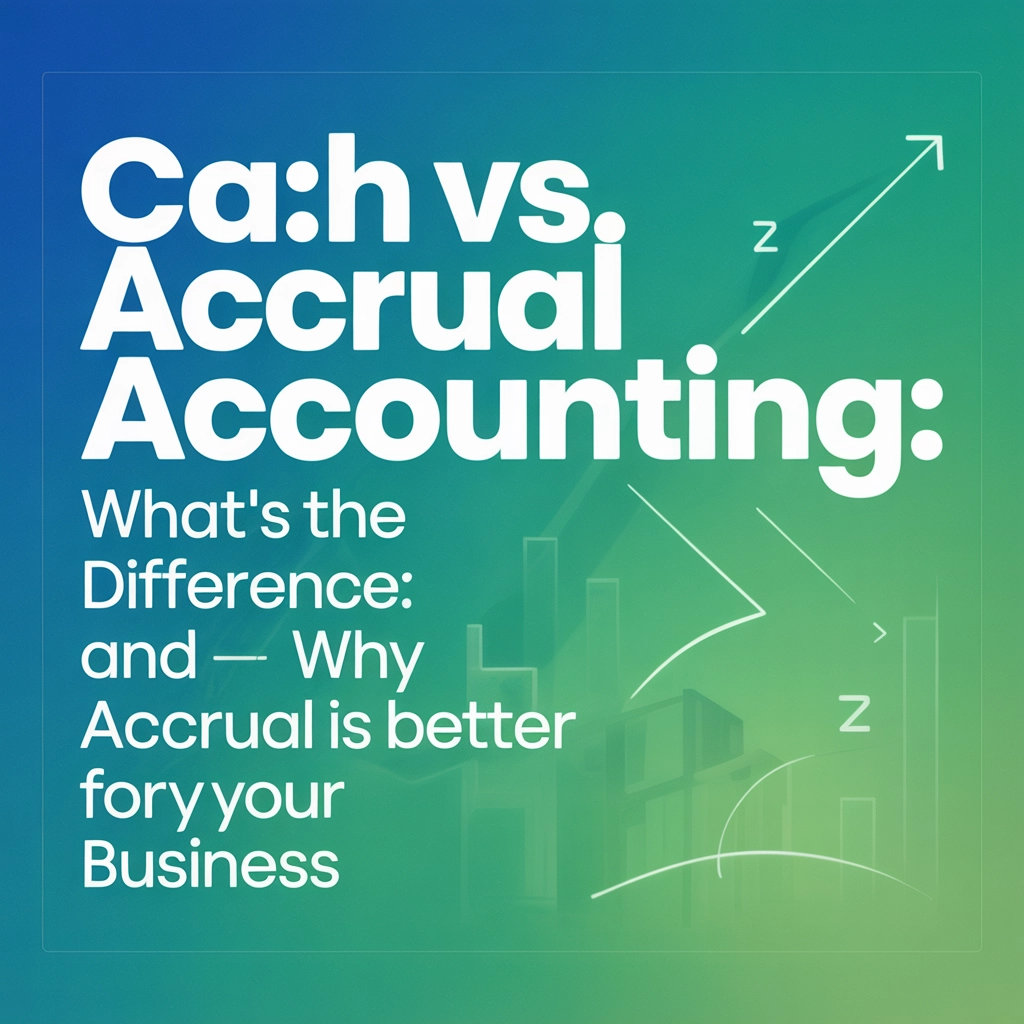Cash vs. Accrual Accounting: What’s the Difference and Why Accrual is Better for Your Business

Ever find yourself wondering why there are two different ways to do your business accounting—and which one is best for you? If terms like “cash accounting” and “accrual accounting” feel like accounting jargon, you’re in the right place. Let’s break down the key differences, see how each works, and explain why the accrual method often gives businesses a real edge.
What’s the Real Difference? It’s All About Timing
At the heart of it, the difference between cash and accrual accounting comes down to timing. It’s about when you record revenue and expenses in your books—not just how much. This simple difference can have a big impact on how you see your company’s performance, manage your money, and plan for the future.

Cash Accounting: Simple, Straightforward, and Immediate
With cash accounting, you log money when cash actually changes hands. Get paid for a job? The day you see the money hit your account, that’s when you record your income. Pay a bill? You record the expense the moment the payment leaves your account, not before.
Pros of Cash Accounting:
Simplicity: If you can balance a checkbook, you can probably handle cash accounting.
Clear Cash Flow: You always know how much money you have on hand.
Great for Very Small Businesses: If you don’t carry inventory and get paid immediately, this method makes sense.
Example:
Let’s say you’re a freelance designer. You invoice a client in March, but they pay you in April. You record the income in April—the day you deposit the money.
Limitations:
Can give an incomplete picture if you have outstanding invoices or bills.
May make your business look more profitable or less successful than it actually is, depending on the timing of payments.
Accrual Accounting: The Real Story of Your Business
Accrual accounting tells a different story—it captures the bigger financial picture. Under accrual, you record income when you earn it, even if you haven’t been paid yet. Same goes for expenses: log them when you incur them, not necessarily when you pay.
Pros of Accrual Accounting:
More Accurate Financial Picture: You see earned income and incurred expenses in the period they relate to, not just when cash moves.
Better at Showing Profitability: You can match income with costs to truly see if a month or project made money.
Required for Some Businesses: The IRS requires certain larger businesses or those with inventory to use accrual accounting.
Example:
Using the same freelance designer scenario, you record the income in March—as soon as the work is delivered and invoice sent—even if you don’t actually receive payment until April.

Why Accrual is Usually Better (Especially as Your Business Grows)
While cash accounting is simple, its main weakness is that it can paint a misleading picture. Here’s why more businesses choose accrual as they expand—and why you might want to as well.
1. See the True Health of Your Business
By capturing revenue when you earn it and expenses when you owe them, accrual accounting gives you a real-time view of your performance. This is crucial for making confident, informed decisions—especially if you’re dealing with delayed payments, large shoots of activity, or upcoming expenses.
Scenario:
You complete $10,000 worth of projects in December but don’t get paid until January. With cash accounting, December could look dead, while January looks like your business exploded. Accrual shows what actually happened when it happened.
2. Smarter Budgeting and Decision Making
Accrual lets you plan ahead. Because all income and expenses are accounted for in the period they relate to, you can budget based on what’s actually happening—not just what cash is sitting in the bank at a given moment.
3. Better Tracking for Receivables and Payables
If you invoice customers or get billed by suppliers, accrual accounting tracks every dime owed to you and every dime you owe. This makes collections and bill management much easier.

4. A Must-Have for Growth
The IRS requires accrual accounting for companies with gross receipts over $27 million (as of 2024) or for certain businesses with inventory. If you want to attract investors or lenders, they’ll almost certainly want to see accrual-based statements because they show your true financial standing, not just today’s bank balance.
5. Matching Principle: The Best Reporting
Accrual accounting applies the matching principle—income and the costs to make that income are reported together. This results in reports and profit/loss statements that actually make sense, letting you track trends, measure profitability, and plan for taxes far better.
eal-World Example
Let’s put this into a mini-case study:
Imagine Bookkeeping Made Simple completes a big project in June. The client pays in July. We paid staff and expenses for that project in June.
Cash Accounting: Income in July, expenses in June. Profit and loss statements for both months are skewed.
Accrual Accounting: Both income and related expenses in June, showing the actual bottom line from the project.*
When Is Cash Accounting Okay?
If you’re a very small operation without inventory
You get paid on the spot and don’t hold bills
Tax regulations allow you to use it
But as you scale, take on more customers, deal with receivables, or ever want to see past this month—accrual is better.

Are There Downsides to Accrual?
A few:
More record-keeping and slightly more complexity
You’ll need to monitor your actual cash flow, since you can show a “profit” without having the cash in the bank
But with great bookkeeping software (or a team like ours—see our services), these challenges are easily managed.
Bottom Line: Accrual Moves Your Business Forward
If you want to really take control of your business finances, understand how you’re performing, and make smarter plans for growth, accrual accounting is the way to go. It might take a little more effort—or professional guidance—to set up, but the transparency and actionable insight are worth it.
Ready to get clarity on your business numbers? Whether you’re ready to switch or just have questions, Bookkeeping Made Simple is here to help.
Curious how we make accounting easy?
Find out more about our services or schedule a consult.

